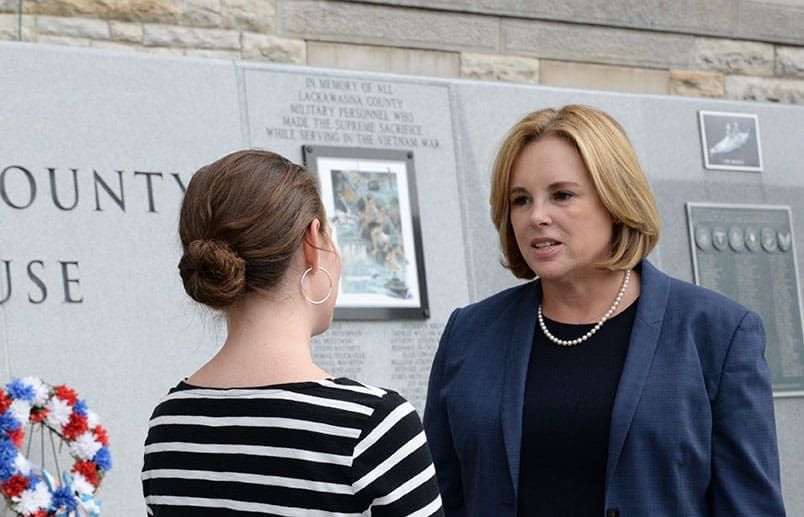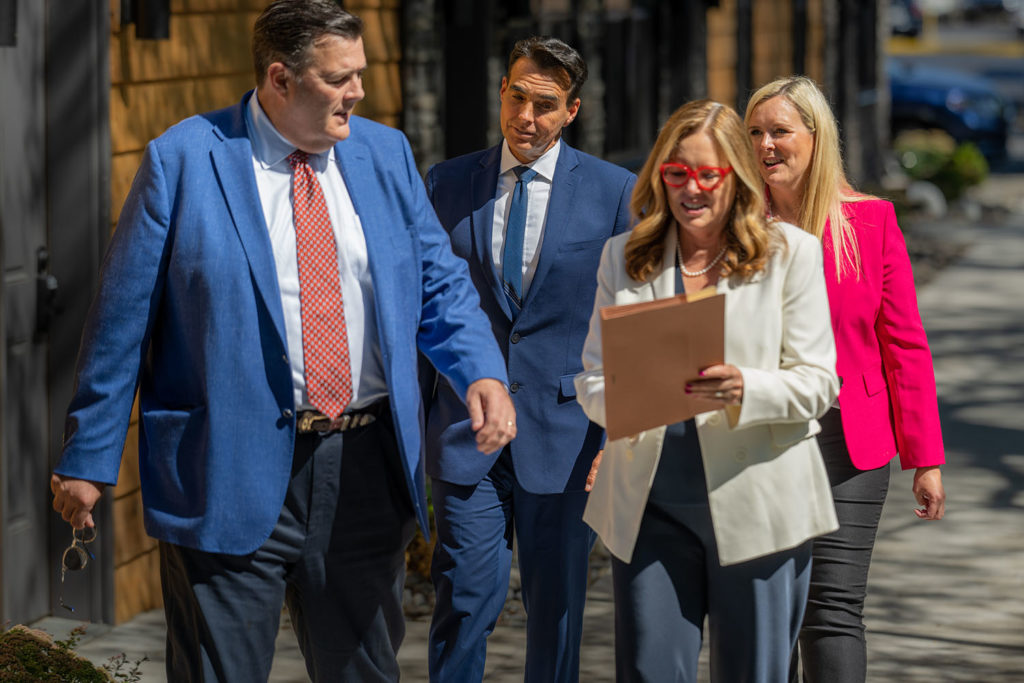Nursing homes are meant to be strictly regulated. Staff in assisted living facilities and nursing homes must protect their residents and preserve their dignity. When you trust your loved one to a professional or facility, you expect them to be properly cared for and safe.
However, abuse in nursing homes and assisted living facilities happens every day. In 2020, nursing home ombudsmen throughout the United States saw over 15,000 complaints related to abuse or neglect. These are just the incidents that are reported, however. Elderly residents are often unable or hesitant to report abuse, and family members can miss some common nursing home abuse signs.
If you suspect your loved one is facing abuse or neglect in their nursing home or facility, speak with a Pittsburgh personal injury attorney. Our team of personal injury lawyers can work with you to protect your and your loved one’s rights and pursue compensation for any injuries suffered.
$32 Million Wrongful Death
$26 Million Truck Accident
$20 Million Commercial Vehicle Accident
$19.8 Million Truck Accident
$17.5 Million Car Accident
$12 Million Work Injury
$11 Million Truck Accident
$9 Million Truck Accident
$8 Million Truck Accident
$8 Million Truck Accident
$7.5 Million Auto Accident
$6.9 Million Garbage Truck Accident
What Causes Nursing Home Abuse?
Pennsylvania has the fourth-highest population of residents 65 and older, and the number of people 60 and older in the state is expected to reach approximately four million by 2030. As the elderly population rises, more people will need long-term care. To date, an estimated 1.3 million Americans live in nursing homes, and many more participate in other long-term care programs.
Nursing homes throughout the country are severely understaffed. For-profit nursing homes, in particular, will often put as few people on the payroll as possible to maximize profits. Due to staffing issues and the intense nature of the job, staff and caregivers often suffer from sleep deprivation, stress, and an overall negative approach to their jobs.
Other common reasons why abuse and neglect happen in nursing homes include:
- Inadequate training – With staffing shortages, many care homes don’t have time to properly train new staff
- Negligence in hiring – To mitigate staffing issues, some care homes may neglect to perform thorough research into potential new hires
- Poorly maintained facilities – Facility maintenance can take a backseat in many care homes, resulting in dangerous conditions for staff and residents
- High turnover – Nursing home caregivers are often underpaid, and this combined with the intensity of the work environment leads to a high rate of turnover in many nursing homes, leading to care and oversight inconsistencies
Staff in nursing homes are also motivated to hide the injuries of residents, even if those injuries occurred from accidents. Even if caregivers or staff who were not involved in the original incident discover injuries later, they may be pressured to not report these injuries. This means many families are not aware of these issues until it is too late to prevent serious injury or seek better care for their loved ones.
What Are the Types of Nursing Home Abuse?
An estimated 1 in 6 people aged 60 or older has experienced some type of abuse in a community setting. In nursing homes and care facilities, roughly 2 in 3 staff admit to having committed an abuse of a resident in the past year.
Different forms of abuse in a nursing home include:
- Physical – Staff may intentionally or negligently inflict pain or bodily harm through scratching, hitting, shoving, or misuse of restraints
- Emotional – Staff may yell at, insult, or humiliate a resident, use threats to control a resident or isolate a resident from others
- Financial – Staff and caregivers may use a resident’s trust or inability to fight back to steal their money, property, or identity
- Sexual – Staff may take advantage of a disabled resident to perform sexual acts, which are by nature non-consensual
Neglect in a nursing home is considered separate from abuse and can be either intentional or unintentional. In either case, neglect occurs when the facility fails to properly care for a patient by properly observing them or failing to give them the required treatment.
Types of neglect that can occur in nursing homes include:
- Emotional Neglect – A patient may be ignored by staff or isolated from other residents without cause
- Hygiene Negligence – The caregivers may fail to assist a resident with basic hygiene regimens the resident is unable to carry out themselves, leading to infections or diseases
- Malnutrition and Dehydration – Staff may neglect to provide adequate food or water to residents, or restrict access to food or water either accidentally or as a form of punishment
- Medical Neglect – Staff may make mistakes when giving residents needed medication, prevent a resident from accessing medication, or neglect to take care of wounds or infections
- Abandonment – A caregiver may neglect to monitor an older person or otherwise leave an elderly resident to tend to themselves when they require assistance, and in some cases may eject residents from the facility without informing family members
What Are the Warning Signs of Elder Abuse in a Nursing Home?
It is important to know the common signs of elder abuse in a nursing home so you can be your loved one’s advocate.
You should investigate further if you notice:
- Physical marks, bruising, or injuries on your loved one with little to no explanation offered by staff
- Unusual behavior changes in your loved one, especially displays of fear
- Other residents appear to wander unattended or are otherwise withdrawn
- Your elderly loved one suffers from frequent unexplained illnesses
- Missing personal items from your loved one’s room
- Your loved one is suddenly suffering from issues with their finances
- Significant weight loss or gain in your loved one that cannot be explained
- Your visitation with your loved one is suddenly restricted without cause
- The facility smells foul or you discover unsanitary conditions
- Your loved one is left lying in their urine or feces
- Your loved one power of attorney, will, or other legal documents have been unexpectedly changed
If you spot any of these common signs, trust your instincts. Take the steps needed to protect your loved one and many others from potential further abuse.
Common Injuries From Nursing Home Abuse and Negligence
Elderly residents in nursing homes are especially vulnerable to serious injury if they are subjected to abuse or neglect. Nursing home abuse can lead to permanent damages and even death for many victims.
Some injuries commonly seen in nursing home abuse and negligence cases include:
- Malnourishment and dehydration complications
- Broken bones
- Open wounds
- Infections
- Head injuries
- Brain or spinal damage
- Pressure ulcers
- Bed sores
- Aspiration pneumonia
- Choking-related injuries
- Damages from improperly administered drugs
- Altered mobility
- Organ damage
- Wrongful death
Slip and fall injuries are commonly noted with nursing home residents, as well as bedrail injuries from falling out of bed. In addition, poorly supervised residents may wander from the facility and suffer injuries as a result.
What is the Difference Between Neglect and Abuse at a Nursing Home?
Abuse and neglect, while often intertwined, are considered separate categories of elder abuse.
Nursing home abuse is always intentional. Abuse covers physical, verbal, and sexual acts as well as elderly financial exploitation.
Neglect can be unintentional, and is often the result of understaffing and poor maintenance. Sleep-deprived or stressed staff can make mistakes in their care for residents or neglect their needs. However, staff members can intentionally deny essentials to residents as punishment or to otherwise express personal frustrations on the victim.
Laws Protecting Elderly People from Nursing Home Abuse
Several national laws protect Americans from abuse or neglect in nursing homes. These include:
- Nursing Home Reform Act (NHRA) of 1987 – Protects rights of nursing home residents, guaranteeing the “highest practicable” quality of care. Also protects the rights of residents to privacy, freedom of communication, and the ability to voice complaints without retaliation. Ensures residents can participate in family events, set their own care plans when possible, and otherwise expect staff to preserve their dignity in their treatment
- Older Americans Act of 1965 – Created multiple programs for improving the lives of elderly Americans, funding programs to support nutrition, in-home medical care, and transportation as well as programs that prevent elder abuse
In addition to these acts, nursing homes certified by Medicare or Medicaid are subjected to specific federal requirements.
These certified care homes are required to:
- Have at least one registered nurse on duty for at least eight hours a day, every day
- Ensure a licensed nurse is on duty 24 hours a day
- Hire the staff needed to manage all daily operations of the facility
- Offer a minimum of 75 hours of training to all nursing aids
For-profit nursing homes and those otherwise not certified by Medicare or Medicaid are, unfortunately, not subject to these same requirements. However, any nursing home can be reported to a local Ombudsman Office to launch an investigation if abuse and neglect are suspected.
What Evidence Is Needed to Prove Nursing Home Abuse in Pittsburgh?
When your loved one is injured or dies in a nursing home, you may be wondering if the injury was preventable by the nursing home staff. If your loved one suffers from dementia or other illnesses, some injuries will inevitably occur even with proper care.
If you suspect nursing home abuse or neglect led to your loved one’s injury or death, your attorney can work with you to obtain the needed documentation to prove your case. An experienced nursing home abuse lawyer can also review your records with medical professionals, contact witnesses, and perform research into past complaints against the home.
Other important forms of evidence in a nursing home abuse claim include:
- Photo and video evidence of injuries
- Insurance claim documentation
- Documents showing medical expenses
- Inspects and licenses, particularly any pointing to a history of violating legal requirements
What Compensation Can an Attorney Recover in a Nursing Home Abuse or Neglect Case?
In pursuing a nursing home abuse case, your nursing home abuse attorney can help you recover compensation for the financial, mental, and emotional damage done to you and your loved one from the wrongful acts of the care home.
Compensation in a nursing home abuse or neglect case can cover:
- Costs to move to a new home
- Living expenses
- Funeral expenses, in wrongful death cases
- Medical bills for injuries resulting from abuse
- Psychological counseling
- Reimbursement for property losses
- Physical rehabilitation
- Legal fees
- Pain, suffering, and other losses for a wrongful death
In addition, pursuing a claim or lawsuit against a nursing home will hold those who abused your loved one accountable. A case will also protect other residents from future abuse.
Pittsburgh Attorneys Defending Your Senior Loved Ones
Hundreds of thousands of nursing home abuse and neglect cases take place every year in the United States. These situations have a severe adverse impact on victims and their loved ones.
If you have learned your loved one was a victim of nursing home abuse, you and your loved one deserve justice. At Munley Law, our Pittsburgh personal injury lawyers can help you fight for the recovery you deserve.
We have offices in Pittsburgh, Scranton, Hazleton, and other areas throughout Pennsylvania. Reach out to our nursing home neglect lawyers for a free consultation when you call, chat, or contact us online.
Types of Pittsburgh Personal Injury Claims We Handle
There are many different types of personal injury cases. When choosing a Pittsburgh injury lawyer to represent you, it’s important to find someone who has handled cases like yours. Munley Law has successfully secured compensation for victims of the following types of personal injury cases:
-
-
- Pittsburgh car accident lawyer
- Pittsburgh truck accident lawyer
- Pittsburgh motorcycle accident lawyer
- Pittsburgh pedestrian accident lawyer
- Pittsburgh workers’ compensation lawyer
- Pittsburgh bicycle accident lawyer
- Pittsburgh rideshare accident lawyer
- Pittsburgh Uber accident lawyer
- Pittsburgh Lyft accident lawyer
- Pittsburgh brain injury lawyer
- Pittsburgh catastrophic injury lawyer
- Pittsburgh nursing home abuse lawyer
- Pittsburgh premises liability lawyer
- Pittsburgh bus accident lawyer
- Pittsburgh slip and fall lawyer
- Pittsburgh construction accident lawyer
-
Munley Law Personal Injury Attorneys
510 Third Avenue
2nd Floor,
Pittsburgh, PA 15219
(412) 534-5133












